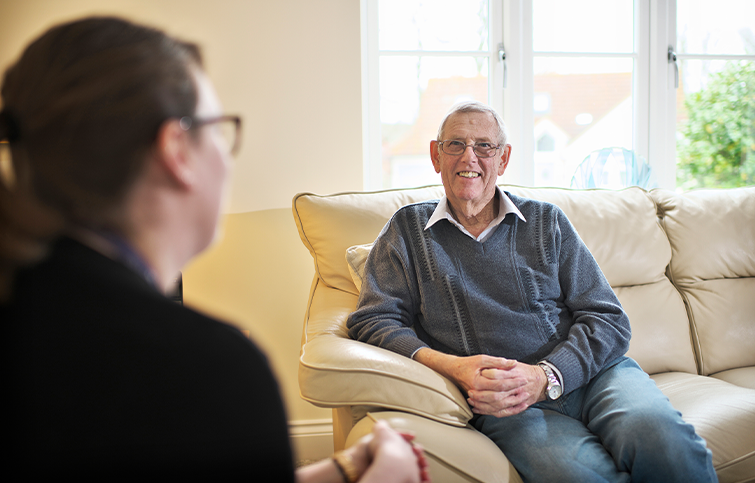Make a difference
People like you help us every day through regular donations
Read stories Donate
We now live with the challenge of supporting our patients at home whilst trying to reduce risk of spreading the virus, and we work in different ways, whether by the telephone, or virtual consultations. We work closely with GPs and district nurses in a team approach to community palliative care.
We do still visit patients face to face at home, but we limit this to necessary visits to try to keep them and their families safe. The new way of working has its difficulties, but with SinglePoint being at the end of the phone 24/7, we are still behind our patients all the way and always at the end of the phone.
I always wanted to be a nurse. I think it’s that cliché of the calling that people talk about. That instinct to want to be a nurse; a calling to be a nurse.
There are loads of photos of me as a child with a little stethoscope and a pillow case with a red heart drawn on it.
All of the sort of natural skills to look after a person at the point in their lives when they need that care most - the interpersonal skills, the communication skills - come quite naturally to me. Now I’m building on the skills about symptom control, to look after the body as well as mind and spirit.
As community clinical nurse specialists before the pandemic, when we first met someone, we would work out what their priorities are and what we felt we could help with. We’d come up with a plan to try to meet those issues and create some goals, and try to meet those symptoms as best we could. In a pre-Covid visit we often explore things like advance care planning in those visits, which is very much about the patient making their choices about how they want their care to be. It might be that somebody wants to die at home and that’s really important to them and we are quite instrumental in organising what needs to happen to make that safe, to make that comfortable, to make the family feel supported because it can be a bit of a bumpy road at the time. We’re there to go alongside with that.
Often people will tell us some of the things that perhaps they’ve never really said to their spouse before, the things that sit really deep in people’s minds and their chests. They have a right to talk about those things and they should be given the opportunity and the space to explore that for them. I’m quite honoured that I get to be the person who helps with that.
These are things I hear a lot and I try to approach that quite early on to say I’m here to support, I’m here to help, and there is no agenda.
I talk about advance care planning only if it is appropriate; I’m there to maybe bring it to the table and maybe see what they feel about it.
They might already have those feeling there but nobody’s ever given them the opportunity to explore it before. For other people it’s ‘that’s not for me’ and that’s fine.
We take a real humanist approach with people. We get to know them as a whole, we get to know their family, and it’s not scary when we get to the door; we’re very friendly! I think we’re very good at relationship building. We take every patient as an individual and we get to know that person and it works, it works really well.
There’s a lot to a person, there’s a lot that makes us whole, and it’s just getting to know what makes that person whole. It could be that they have an interest in sports that resonates with them like the feeling of being part of a team, the feeling of being a fan, or that every Sunday night they’ll be something that they’ll want to watch, that’s a ritual for them. That’s important so we will know, say it was on a Tuesday night and there was a particular football game on they wanted to watch, I wouldn’t call them during that time, that’s their space.
Going through all the journey with their health, all the emotions they’ve seen, and oh here’s another one… But because we take that humanist approach, 99.9% of the time people will engage with us and ultimately people like to share when the time is right for them, and we’re that person to do it with.
It’s going to be different for every person because everyone’s goals are different. For some people it’s about their symptoms; they’ve been living with pain.
There’s a lot more to pain than just the physical side of it, there’s the fear of having it, there’s the anticipation of having it.
Some of our patients will experience what we call total pain; an all-consuming feeling, constant state of pain. So it might not just be pain in your knee because the cancer has spread to your bones, it could be that fear of where else is it spreading to?
Physically feeling that pain, having that knock on effect of you not able to do the things you enjoy anymore because you’re in pain. You might walk differently and you’re self-conscious about that, or it could be that you can’t play football with your son anymore because you’ve got that pain, and then what that means for your family structure. All of that makes such turmoil in people and that is what we call total pain.
You can’t see the wood for the trees when you’re in pain, but we have the expertise to advise and to try to sort that pain for them whether it be with medications or it be with spiritual support or even just a hot water bottle; all simple things really but when you bring it all together, when you really focus on helping that particular symptom, we can make a real difference with that.
I feel really grateful and honoured to be a nurse. I think it’s a real privilege to be a part of a patient’s journey at that point in their life. It’s a very private time but in my role I’m welcomed into that; that’s a real honour. I feel like I’m always learning and I’m always keen to keep learning. And it’s good for my soul because I feel like I’m doing a bit of good every day and that’s important. 
In February, in a pre-COVID world, Roger shared his experiences…

How do you feel when you know what's going to happen in the future? It’s one of those things I think where everybody often says ‘if only I knew when I was dying, I could spend all my money and end up with a penny in the bank, that would be good’. But when it actually comes to reality, it’s a whole different ball game.
It is difficult to deal with emotionally and difficult to talk about at times. But we’ve built up a friendly and comforting atmosphere with Emma already, and I always feel that Emma is there and more than willing to help if I need her or need help with anything. The things she has done with SinglePoint, district nurses, medication, helping with changing to a more local doctor; she has made everything a lot easier.
Emma was our first connection with St Helena. She explained everything they are able to do and pointed out the various things that are available for both myself and my wife, and the family.
She explained all of that and went into detail where it was necessary, and if I didn’t need to know then she didn’t push it.
We are going to try to get me in the hospice for a few days to help with the medication. I’m in a lot of pain in different areas for goodness knows why, but Emma thinks there is a way of perhaps improving on that, which would be really nice.
It’s good to know there are options if you want to be at home or in the hospice.
The matron, who we met on the occasion we went to visit, is a lovely lady, very kind. She showed us all around everywhere and it just looks to be a lovely place, more like a hotel, may I say. Everybody’s kind and helpful and says ‘hello’. Nobody passes you by with their head down, which is nice. I feel quite comfortable that I could go there without a problem.
The hospice is a lovely environment and it’s probably a beautiful place to be if that’s where the end lies.
Emma’s there if we want to ask her a question or we’re not sure about anything. I don’t mind asking her about a silly thing and she seems quite happy to explain it in greater detail if that’s what we’re looking for. So that is very reassuring. A kind lady I think; we’re very happy with Emma indeed. She’s a great kid definitely. 
This story may not be published elsewhere without express permission from St Helena Hospice.

When you make a donation to St Helena Hospice, we are charged transactional fees by other companies, including fees for processing payments made to us, looking up addresses and validating bank account details.
We are very grateful to our donors who offer to offset some of these fees with a minor addition to their total amount. This is however completely optional and we are very grateful for your support whether or not you choose to contribute to processing fees.
CloseWe are able to claim an extra 25p on every £1 on your donation amount for no extra cost to you, as long as you are a UK tax payer; have paid enough income tax or capital gains tax in that tax year; and are donating your own money. If you pay less income tax and/or capital gains tax than the amount of Gift Aid claimed on all of your donations in that tax year it is your responsibility to pay any difference. For more information about Gift Aid, please visit https://www.gov.uk/donating-to-charity/gift-aid




